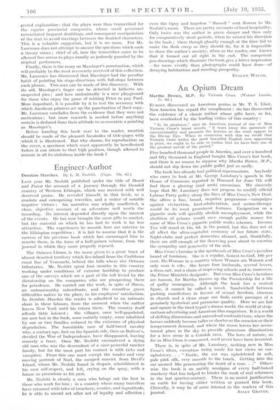An Opmm Dream
Martha Brown, M.P. By Victoria Cross. (Werner Laurie. 7s. ed.) EUROPE discovered an American genius in Mr. T. S. Eliot. Now Anierica has repaid. the compliment she has discovered the existence of a classic author whose gifts have, so far, ',seen overlooked by the 'leading critics 'of' this country : "In its greatness," says an American journal of one of Miss Victoria- Cross's latest novels, "it tears away the garments of conventionality 'and -presents the heroine as she must appear to the Divine', Eye. When in connexion with this we recall that Victoria Cross writes the most beautiful English now appearing in print, 'we ought to be able to realize that we have here ono of the greatest novels of the period." • Five hundred thousand people in America, and over a hundred and fifty thousand in England bought Miss Cross's last book, and there is no reason to suppose why Martha Brown, M.P., should not slip down the public gullet just as easily.
The book has already had political repercussions. Anybody who cares to look at Mr. George Lansbury's speech in the House of Commons reported in Hansard for June 7th will find there a glowing (and arch) encomium, We sincerely hope that Mr. Lansbury does not propose to modify official Labour Party policy along the lines of Miss Cross's New Deal. She offers a fine, broad, negative programme—campaigns against vivisection, food-adulteration, and serum-therapy would be its most prominent features. Emigration on a gigantic scale will speedily abolish unemployment, while the abolition of prisons would save enough public money for some of Miss Cross's gigantic public works schemes. Income Tax will stand at 18s. ed. in the pound, but this does not at all affect the ultra-capitalist economy of her future state. Night-clubs and perfect domestics abound, and, thankfully, there are still enough of the deserving poor about to exercise the sympathy and generosity of the rich.
Miss Cross's heroine is the apotheosis of Miss Cross's peculiar brand of feminism. She is a regular, honest-to-God, 101:), per cent. He-Woman in a country where Women are Wonien and only man is vile.- She keeps four husbands, several lovers, a dress suit, and a chain of improving schools and is, moreover, the Prime Ministrix' designate. But even Miss Cross's heroines are human, for Martha throws up the Premiership for a life of guilty monogamy. Although the book has a central figure, it cannot be called a novel. Sandwiched between gushing manifestoes in favour of sexual freedom, cinemas in church and a clean stage one finds erotic passages of a genuinely hysterical and paranoiac quality. Here we are fair and square in the tired typist's dream world, the world of strip- cartoon advertising and American film magazines. It is a world of shifting dimensions and unresolved contradictions, where the heroes suddenly become taller or shorter as the occasion Or their temperament demand, and where the moon leaves her accus- tomed place in the sky to provide glamorous illumination for a love scene in a Cornish cave. The laws of nature, as far as Miss Cross is concerned, need never have been invented.
There is, in spite of Mr. Lansbury, nothing new in Miss Cross's ideas, exception being made for her views on car- upholstery. . . " Inside, the car was upholstered in soft, pale pink silk, very smooth to the touch. Getting into the car seemed like penetrating the heart Of a rose. ." Other- wise the book is an untidy amalgam of every half-baked crankery that has helped to hinder the work of real reformers in the last quarter-century. There is no mOral justification on earth for having either written or praised this book. Clinically, it may be of sonic interest to the readers of this


























































 Previous page
Previous page